 Do I really need to talk to people I disagree with?
Do I really need to talk to people I disagree with?
It's been a couple of weeks but today, I want to offer another installment of "How do we live in these days?" If you missed the last post about privilege, you can read it here.
I’ve been thinking a lot this week about how easy it is for you and I to stop talking to one another when we don’t agree especially now in times like this.
And, I’m wondering- how many times in the past couple of months have you blocked or hid friends on Facebook after they posted that article or meme for the 40th time about a political idea you don't agree with? Or been leery of going home and sitting around a family dinner table because you know that ___ will be there and say something you find offensive?
I know this much is true: lively, respectful, conversation is an art form that has grown harder and harder to engage in by the day.
Sharp edges are everywhere.
We are all prone to shut down on arrival.
It just seems easier to keep our mouths shut and stick close to people like us.
When I was preparing to preach last Sunday at University Christian Church in Hyattsville, MD I sat close to the story of the Samaritan Woman for the week and felt convicted all over again about Jesus' example of what it means to be in conversation people for whom I might disagree.
In John chapter 4, we read that Jesus and his disciples were on the road and they’re running low on supplies. Verse 8 tells us that the disciples take a detour into town to buy food. But Jesus hangs back. It has been a busy couple of days. And he realizes that a moment of rest might do him some good. It’s around lunchtime. The sun is out. It’s the hottest time of the day. Jesus looks for some shade and finds it close to a well.
 BUT then, a woman approaches fetching water. She has a bucket. Jesus does not. Jesus has been thirsty for quite some time. He asks the woman to get him a drink of water. A conversation between an unlikely pair begins!
BUT then, a woman approaches fetching water. She has a bucket. Jesus does not. Jesus has been thirsty for quite some time. He asks the woman to get him a drink of water. A conversation between an unlikely pair begins!
I say unlikely because it would have been the cultural norm for Jesus just to ignore this woman. (Please note: John does not even give us her name!) Take a nap. Keep to himself. Save his energy for a larger scale teaching engagement. After all, he is a Jew from Galilee and she is a woman from Samaria. Men and women, non-related at this time did not converse in public places. Nor did Jews and Samaritans.
But it was time to talk. And as much as the woman wanted Jesus to focus on the literal, the substance of the water, Jesus carefully moved the conversation to the soul.
To get to this deeper place, Jesus speaks to her more personally.
I can imagine he looks her directly in the eyes and tells her that she’s had 5 husbands and the man she’s living with now is not her husband-- all to the amazement of the woman. It was true!
I read an article this week by John Piper, a conservative theologian for whom I usually disagree and his take on John 4 is no exception. He calls the woman in the passage a “worldly sensually-minded, unspiritual harlot from Samaria” and later he refers to her in his sermon as a whore. He makes the point that Jesus is lavishly lowering himself to her level. And that in her sin, Jesus is calling her out and hoping she’ll accept his invitation of eternal life.
And even if you and I don’t use such strong language about her as Piper does, I believe we’re also prone to look down on her too? Many of us equate the Samaritan woman with a prostitute even though the language of the text does not contain this word.
Yet in our judgment, we overlook so much of the cultural context of this story.
Professor David Lose further explains: “She very easily could have been widowed or have been abandoned or divorced (which in the ancient world was pretty much the same thing for a woman). Five times would be heartbreaking, but not impossible. Further, she could now be living with someone that she was dependent on, or be in what’s called a Levirate marriage (where a childless woman is married to her deceased husband’s brother in order to produce an heir yet is not always technically considered the brother’s wife). There are any number of ways, in fact, that one might imagine this woman’s story as tragic rather than scandalous, yet most preacher’s assume the latter.”
But Jesus shows the way of love. Jesus never calls her out as a sinner. Jesus never asks for her repentance. Jesus never focuses on the fact she’s had 5 husbands other than the fact that it’s just details in her story.
Jesus offers dignity.
We don’t hear him talking down to her, looking down on her or saying, “Well, I’m Jesus so I’m of course I'm better than you—so you stay over there while I stand here.”
No! Not at all. Jesus sees her for her. What a powerful moment this!
A bridge of relationship forms because a conversation is not just exchange of words between two people but a connection. An authentic connection.
My friends, isn’t this what our world needs more of from us as people of faith?
Conversations partners with willingness to put barriers aside and just listen.
Conversations partners who show up to listen and not judge
Conversation partners who love before we’re quick to condemn
Dan Kimbell in his book, Adventures in Church Land says this: “Many of us have so few friendships with others outside the church so that people see only the aggressive street evangelists or a pastor on the news who got caught in some scandal or who is being interviewed and saying some nutty things. If people don’t see normal, day-to-day examples of real-life Christianity, then we shouldn’t be surprised if the scandals and the extreme voices end up defining their view of the church.”
Or in other words, what are we doing to be conversation partners with those who most need to be seen, loved and understood (even if they're different from us)?
I believe keeping conversation alive IS the way we live in these days. Who do you need to talk to?
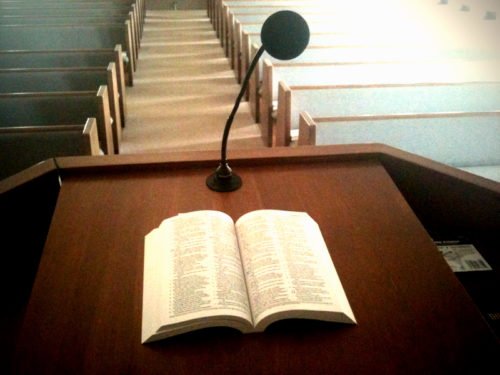 Should preachers stay away from politics?
Should preachers stay away from politics?
Welcome to this week's edition of "How do we live in these days?" If you missed the first post last week about justice, kindness and humility you can read it here.
Unless a preacher finds themselves in a politically homogenous congregation (do these really exist?) OR in a congregation with their heads stuck in the sand, the pressure is intense to tow a fine political line.
If we thought the election cycle would be the end of our drama, it's not.
We all talk about politics.
We fight about politics especially on Facebook.
We bring our political convictions with us to church.
Our airports, our county courthouses or in the case of my town, Pennsylvania Ave is crowded with protests and will be for a long time.
So on Saturday nights across America, preachers are facing a new struggle. How do they both stay relevant to what everyone is talking about throughout the week? And if so, how do they not lose their jobs by Monday morning for sounding "too political" in the pulpit?
One of the major arguments that is used to stop preachers from mixing politics and religion practice is separation of church and state.
Just last week someone asked me: "Isn't it wrong for pulpits to speak endorsements for one person over another?"
Yes.
According to the Johnson Amendment (which our current President is trying to repeal): All 501(c)(3) non-profit organizations are opposed from endorsing or opposing political candidates. Most churches in America are considered 501(c)(3) either through tax status acquired directly or via their larger denominational body.
So, legally hear me say: it is wrong for pulpits to be used to endorse one candidate or political party over another (unless they want to be in danger of losing their non-profit status under current law).
And as a minister raised in the Baptist tradition, an American tradition built on the dissent of founders such as Roger Williams, I am a whole-hearted believer in the separation of church and state.
Separation of church and state is so important to our democracy because it holds in check one of the basic tenants of our democracy: freedom of religion.
This freedom gives us the choice to be Christian, Jewish, Muslim, Hindu, and so on OR nothing at all if that's our wishes without fear of persecution.
And without separation of church and state our government could set up a state-run church and fund it with our tax dollars. And remember from history this is why many of the first colonists settled in America. They wanted to be free from the Church of England telling them how to worship.
But, separation of church and state doesn't mean that our churches and their pulpits need to live in vacuums.
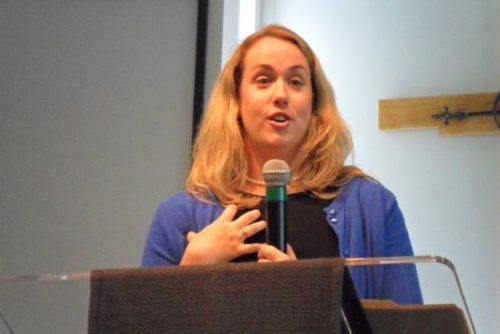 One of the great tasks of any preacher is to bring good news. And good news is not good news without a context. We need our preachers to talk about what our lawmakers and governing bodies are doing and how their actions fall in line (or not) with the teachings of Jesus.
One of the great tasks of any preacher is to bring good news. And good news is not good news without a context. We need our preachers to talk about what our lawmakers and governing bodies are doing and how their actions fall in line (or not) with the teachings of Jesus.
No one political party gets a free pass or is always in the right or wrong.
And not only this, but it is the job of any preacher to speak truth to power.
Jesus had a lot to say about this. Sure, he spoke of "giving Caesar what is Caesar's and to God what is God's" teaching us to respect our government's rules. But he also wasn't afraid to challenge the powers when he felt like they implemented unjust laws, practices or actions. He told those trying to stone the woman caught in adultery, "Who here is without sin? Let him cast the first stone?" He overturned tables in the temple courts when he saw faith weighed down in consumerism. He spoke boldly of his Lordship even to the Roman ruler, Pilate even when it led to his execution.
So as a preacher ordained to live out and help others live out the teachings of Jesus . . .
Teachings like "loving my neighbor as myself" (Luke 10:28)
Teachings "going into all the world and preaching the gospel." (Mark 16:15)
Teachings like "welcoming the stranger." (Matthew 25)
I must speak out when our nation makes laws or our President makes statements that go against my faith.
I'm just doing my job. And my colleagues are too!
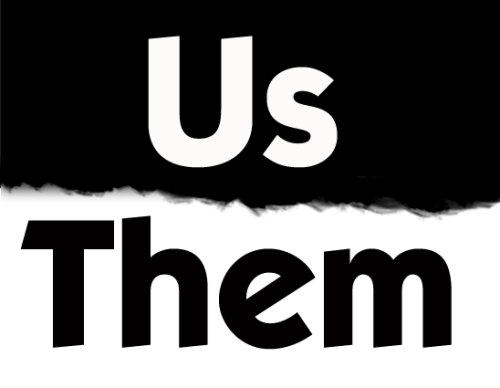 Recently while in the religion section of Barnes and Noble, I found two books in that struck me indicative of America at this juncture.
Recently while in the religion section of Barnes and Noble, I found two books in that struck me indicative of America at this juncture.
One was entitled Why the Christian Right Is Wrong and the other was God's Own Party: The Making of the Christian Right.
I felt like both covers were screaming at me. Both books not only expressing their views, but expressing their views at the cost of the other. And these weren’t the only ones—there were so many more!
We buy books like this from whatever camp we find ourselves in because it’s so much easier (and fun) to surround ourselves with people who think exactly as we do, right?
And this is where the wars of words begin:
Red State vs. Blue State.
Fox vs. MSNBC
Pro Life vs. Planned Parenthood
And us, religious types are the WORST. We love a good game of us vs. them.
The "them" side isn’t as enlightened, or as smart or as representative of the true faith like we are. We stake the claim of the divide with statements like this-
You believe gay marriage is ok. But we believe marriage is between a man and a woman.
You believe the Bible is without errors. But we believe it is full of them.
You believe all religious paths lead to God. But we believe in Jesus is the only way to God. (The list could go on and on)
And we de-friend both in real life (and on Facebook) once we see the side people fall on.
Such happened to me recently and it really surprised me.
I met a new colleague. Though we both profess the Christian faith, we’re a unlikely match. But now I call him my friend.
He likes to go on mission trips for the sake of evangelism. I don’t feel this is the best use of my resources.
He likes telling me about his prayers using specific scriptures. I am not one to be showy about how I pray for people.
He chooses to live in part of the country where Christian churches are the norm. I prefer to be surrounded by diversity.
But as I’ve gotten to know this colleague, I’ve seen his heart. I've watched him give and give of his resources to others. I’ve received comfort from his beautiful prayers for me. I’ve found nuggets of common ground in our theological conversations.
But, this is what I know:
We're both are children of the same heavenly Parent.
We're both bearers of divine light (even if I still think my choices are the best ones for me).
And he’s challenging me to see God beyond the walls of my own bias.
This is why the us vs. them wars never work and can’t be our norm practice if we want to live in peaceful corners of plant earth. God is always in the business of surprises. 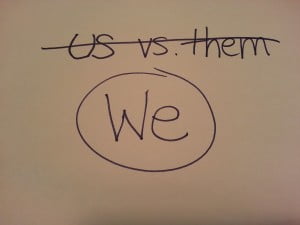
This does not mean that there isn't a time and place for speaking truth to power and movements for justice but . .
Our best energy, my friends can’t be used up in fortifying ourselves for battle with them.
We’ve got more important work to do! Feeding the hungry, seeing the unseen, uplifting the lonely. Work we can do together.
It is easy in many religious circles to push people away based on what they believe or profess.
We can't be friends anymore because you believe in evolution. I believe in creationism.
We can't be friends anymore because you believe in gay marriage. I believe marriage is between a man and a woman.
We can't be friends anymore because you believe the Bible is without errors. I believe it is full of them.
We can't be friends anymore because you believe all religious paths lead to God. I believe you must pray only one prayer to be assured of heaven at the end of it all.
Now while the exact phrase "we can't be friends" may or may not come up, the sentiment is still there. We cling to those who are like us. We tarry from those who are not. Journey into the Christian community a little bit at all and you'll find such to be true.
We love to spent our time saying who is in and who is out.
Recently while at a Barnes and Noble, I found two books in close prolixity to each other that struck me as odd. One was entitled Why the Christian Right Is Wrong and the other said Reclaiming America's Conservative Future from the Wacky Liberals. Oh how fun it is to believe we've got the correct market on God and try to make money writing about it.
But what happens when God comes close to you in someone you don't expect? What if you see the presence of God in a neighbor that your church teaches you to shun? What if you find the Spirit in a place your colleagues or family likes to label as evil?
It is when love changes things. For it is hard to cast a person or their faith aside when you begin to love them, when you begin seeing the tenderness in their soul, the deep pains of their life and the shared fears that go into making us a part of the human family.
Recently I made a new friend. We are an unlikely match. He is a fan of the seven day creation theory and likes to talk about it, a lot. I don't care one way or the other very much. He likes to go on mission trips for the sake of evangelism. I am not sure such is the best use of his resources. He is 30 years older than me too and from a part of the country that I am not particularly fond of. But we've become friends and out of this friendship I've seen his heart. I know he means well and just wants the best life can be like I do. I know he authentically wants others to experience more of God's love in his life just as he is doing. I respect him. And in my own way I wish my generosity of spirit was as deep as his.
Love changed my hardened heart about folks of "his kind" and I am making baby steps in a new direction. It's new and scary to make friends like this but wonderful too.
I can't help but think we all need to keep challenging ourselves in this way. In this week ahead of a presidential election may we all think twice before we tweet a hateful remark about "the other side." Or stop ourselves short of defriending a relative on Facebook who posts ideas we don't agree with. Or stop ourselves short of trash talking over dinner another's church with the loud worship band and projector screens when we prefer the quiet. It is the little things, we know...
May we all open room in our heart for the possibility of love changing things, finding friends on unexpected paths.
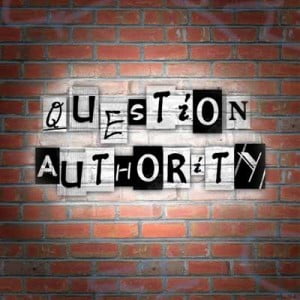 Authority that Speaks for Itself
Authority that Speaks for Itself
Matthew 21:23:32
Trust and politicians don't seem to go in the same sentence, do they? John Quiton once said, "Politicians are people who, when they see light at the end of the tunnel, go out and buy some more tunnel."
For even as we spent time this morning in our prayer, praying for peace and wisdom for our elected leaders, often it is our first reaction when we think of those in "authority" over us, is not to respect them. For as Doug Larson, once said, "Instead of giving politicians the keys to the city, it might be better to change the locks" we agree whole heartedly.
Just as one recent public survey poll reported, over 60% (and with the percentages on the rise all the time) don't trust governmental leaders to do what they say tey are going to do, we are a people (and for good reason of course) who have distasteful sentiments of those who claim "authority" in any area over us. And such is also true of those in positions of religious leadership too.
It's no conscience that when I say, preacher, many of you have images come to mind of sex scandals--Tim Haggard the evangelical pastor who could never admit he was gay-- money laundering scandals, Jimmy Swaggered and his trail of tears, or even of crazy cult scandals--images of Jim Jones and the deadly kool-aid which are all engrained in our memory. All this to say, we are a distrustful people, after all the evil that has been done in the name of "God told me to do this."
But, this is what I really want you to hear today: I think God wants us all of us to go home sell everything we have as quickly as possible and return to the church in 3 days and give all the money to me so that I can grow our church into a great empire . . .
(This is where you are supposed to say, "Yeah right. No way, Pastor and laugh me out of the sanctuary this morning)
But, even as what I just said was completely a joke, I think our issues with those claiming absolute authority over us, is as much about our shared experiences of watching the corruption of power manifest before our eyes as it is our own sense of feeling threatened by those who seem to suggest special knowledge over us. We are all Americans after all-- the land where everyone's voice and vote is supposed to be heard as much as anyone else. In this church, we are Baptists after all-- where we are firm believers in the priesthood of all-- that I have no more of a direct line to pray and hear from God as you do. Simply put, authority is not one of our favorite words.
When we begin to look at our Gospel reading for this morning, we encounter a group of the religious establishment who was both skeptical and threatened by the authority Jesus was seeming to stake his ministry on. For in this religiously saturated culture, much like ours, the chief priests and the elders had not seen anything like the clarity of thought and boldness of action in this man who called himself Jesus.
The story goes that Jesus has just made the religious leaders of the day really mad. On this third and final visit to Jerusalem, Jesus not only stirs up the crowd by his triumphant entry, as palm branches were waved over the shouts of "Hosanna, hosanna, blessed is he who comes in the name of the Lord" but Jesus did the unthinkable. He went into their more sacred of sacred places, the temple and placed judgment on a common practice-- the buying and selling of goods in the temple courts.
It wasn't just the act of turning over the tables in the temple courts that upset the religious leaders so much-- it was the fact that Jesus had the guts to do this with such unashamed authority. Jesus dared to touch ancient Judaism's sacred cow if you will, order of religious practice calling the temple, HIS Father's house.
And this is where the story before us in our text for today begins the narration. Look with me at verse 23: "When Jesus entered the temple, the chief priests and the elders of the people came to him as he was teaching, and said, 'By what authority are you doing these things, and who gave you this authority?"
I guess, in a roundabout way, this was a nicest question they could ask Jesus in public and keep up appearances. I bet they really wanted to say something to Jesus like, "Who in the hell do you think you are coming in here and trying to make us look bad?"
But, alas, they question Jesus' authority to speak and act as he does for the sheer reason that they want to get into a debate with him and make him look bad. They want to know the name of his teacher, basically because as one commentator writes, "If you can identify someone's teacher, then you can better grasp what they 're about. [Or,] more to the point, they are prepared to counter any and all claims to human authority
with their own authority."
But, Jesus, being the smart guy that he was does not find himself trapped in this series of questionings. No, Jesus directs the teachers of the law by asking his own counter question in verse 25: "Did the baptism of John come from heaven, or was it of human origin?"
We get to listen in on the internal monologue of the religious leaders and learn that they didn't want to pick sides.
As we hear the thoughts of these folks, we learn that they were the definition of what we like to speak of in modern times as political correctness.
They knew they couldn't say that John the Baptist, the precursor to Jesus, had authority from heaven-- because it would bring into question why John's ministry wasn't supported by them. And, they also knew they couldn't say that John the Baptist's authority came from himself--- because they knew that there were many John fans in the gathered audience.
So, Jesus gets them to vocalize what was the TRUTH in their hearts: they didn't want to stake a claim on Jesus.
While you and I might find the details of this passage confusing-- I have to admit that I really admire the gutsiness of Jesus to speak truth to those in power and to bring out the reality of what was really going on in the hearts and minds of those gathered around him. Jesus was forcing the religious leaders to say, "This I believe" (though we realize that this is something that they will not do).
We all understand how difficult this is, right?
To begin a conversation with "This I believe" is often a top our fear list-- because if we say we know something for sure, even if we say it in
passing, it's something that others can hold us accountable to.
In particular, more than saying we believe gravity holds us to the earth or the sun will rise and set each day, it's even more frightening for some of us to begin a conversation with "I believe in Jesus, as God's Son" because we know if we do, we could seriously offend others. We might make a fool of ourselves. We might even find ourselves with great disappointment in our hands after Jesus doesn't act in our lives as we hope
he might.
On Wednesday Night, those of us gathered at the Amazing Grace book study, we ventured into this conversation topic of what it means to say that we believe in Jesus.
It is an easy temptation, we noted to not want to fully commit our lives to Jesus with the excuse of "I'm not perfect enough yet" or "I don't know
enough yet." We think because we can't say with our mouths "I believe in Jesus" and talk intelligently about it, then we aren't worthy enough to
be a Christian.
With the class, I relayed the story of one of my first pastoral visits I made during my tenure as pastor at Washington Plaza. Grandison Jones made an appointment to meet with me, wanting to get to know me better and talk about one of my latest sermons.
When I asked him to tell me about his church and religious background, he said I needed to know about all of the years he spent in church choirs, especially in the Episcopal church in his early years.
As he described this experience of how much he enjoyed singing and how moving choir music was for his soul, he told me there was a turning point for him that changed the direction of his spiritual life. He was singing one day, he said with the choir, and after the sermon, there came a point, as it was done every Sunday when the congregation said together the Apostle's Creed.
Saying this creed or a statement of faith that generations of Christians had claimed as a summary statement of belief, was something that Grandison noted that he had recited every week previously, but this particular week he thought to himself, "Grandison Jones, you don't believe a word of that you are saying, so why don't you stop just going through the motions of repeating it."
I think this was one of the first stories that Grandison related to me-- may he rest in peace now-- because he wanted to shock me a little and see how I reacted to him, to see if he would still be welcome in the church even with all of his questions.
But if you had the privilege of knowing Grandison, you know that a man who was here with a smile on his face, beating even Ernie and Dave to church on many Sundays (which is hard to do, you know), was a person who wasn't far from faith. He built by hand the pulpit on which I preach
from this morning and lived out many acts of service that were rarely seen and not done for the purpose of showing off or somehow getting ahead in any way among the ranks of church leadership. But yet even up until the days of his death, it was hard for him to say with his words, "I believe in Jesus." In fact, I don't ever remembering hearing him saying this at all.
Yet, in this struggle to understand what it means to stake a claim of belief on Jesus-- asking ourselves do we have to make faith statements or do we have to show faith in our actions-- Jesus informs our thinking here with a parable.
"A man had two sons. He went to the first and said, 'Son go and work in the
vineyard today.' He answered, 'I will not'; but later he changed his mind and
went. The father went to the second [son] and the said the same; and he
answered, 'I go, sir.'; but he did not go. Which of the two did the will of his
father? They said, 'the first."
In this story, we find an appreciation by Jesus of the struggle of belief-- while the first son says in the beginning, "No I won't go" in the end this
is the son who changes his mind and does as his father asks while the second son speaks loudly at first-- sure I'll go but whose actions don't follow
through.
From this parable I gather that authority, according to Jesus rests in actions. Why did he want people to follow him? And for his future disciples, how would he want them to make known his authority?
This is not to say that Jesus didn't care about words and the confessions they can make, but words, he knew would never be the whole story. For Jesus, his a mission that was never about proving himself through particular words or wielding political power or even being able to pass a test which said he had the proper knowledge of the Torah. It was always about simply being who he was, for the authority on which his life's
work rested would simply speak for itself.
So, today, I ask you not what do you believe, but who are you? Whose are you? On what authority are you resting your life? What do our actions show about the fruits of the spirit-- love, joy, peace, patience, kindness, goodness and so on appearing the world ? What do our actions show about what we really believe in our hearts, even if can't yet say the words aloud? Didn't St. Francis of Assisi once say, "Preach the gospel at all times and if necessary use words?"
I am not saying that words of faith aren't important. I'm not saying that professing "Jesus as Lord" is not something that we should learn to
say together. I'm not saying that we should throw out altogether the historic words of the Creeds (as we said together earlier in the service), that our forefathers and mothers in the faith have shared together.
But, what I am saying today is let us shy away from Jesus because we can't say yet what we think are all the "right words." Let us affirm together the journey that each of us are now. Let us commit together anew to allow the life and work of Jesus to soak into your daily life with no checklist of what this journey looks through the ups and down and twists and turns. Knowing that as we stay on the journey, it becomes just a little easier
every step, every day, every week, every year to follow Jesus both in actions and words.
So, let us join our voices and sing, I have decided to follow Jesus-- such is something I could imagine that Grandison, even Grandison would cheer us on in singing this day-- as he's conversing with Jesus as we speak, asking him now all his questions.
Let us keep following this day.
AMEN